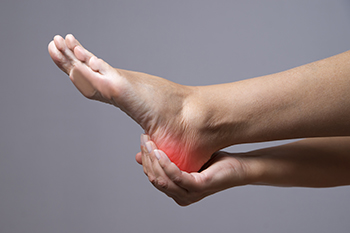
Drexel Hill (484) 521-0233
West Chester (610) 436-5883

Drexel Hill (484) 521-0233
West Chester (610) 436-5883

Ankylosing spondylitis, or AS, is a type of arthritis that primarily impacts the spine but can also affect other areas, including the heel. In people with AS, inflammation can extend to the tendons and ligaments surrounding the heel, causing significant discomfort. This condition can lead to heel pain, swelling, and stiffness, which may worsen with activity or after prolonged periods of rest. Often, the inflammation in the heel is due to enthesitis, which is inflammation where tendons and ligaments attach to the bone. Managing heel pain associated with Ankylosing spondylitis typically involves a combination of medications to reduce inflammation, exercises to improve mobility, and proper footwear to provide adequate support. If you are experiencing heel pain and suspect it might be linked to AS, it is suggested that you seek specialized care from a podiatrist. A podiatrist can offer targeted treatments and strategies to alleviate discomfort and improve your quality of life.
Many people suffer from bouts of heel pain. For more information, contact the podiatrists of Dr. Siegerman & Associates. Our doctors can provide the care you need to keep you pain-free and on your feet.
Causes of Heel Pain
Heel pain is often associated with plantar fasciitis. The plantar fascia is a band of tissues that extends along the bottom of the foot. A rip or tear in this ligament can cause inflammation of the tissue.
Achilles tendonitis is another cause of heel pain. Inflammation of the Achilles tendon will cause pain from fractures and muscle tearing. Lack of flexibility is also another symptom.
Heel spurs are another cause of pain. When the tissues of the plantar fascia undergo a great deal of stress, it can lead to ligament separation from the heel bone, causing heel spurs.
Why Might Heel Pain Occur?
Treatments
Heel pain should be treated as soon as possible for immediate results. Keeping your feet in a stress-free environment will help. If you suffer from Achilles tendonitis or plantar fasciitis, applying ice will reduce the swelling. Stretching before an exercise like running will help the muscles. Using all these tips will help make heel pain a condition of the past.
If you have any questions please contact one of our offices located in Drexel Hill and West Chester, PA . We offer the newest diagnostic and treatment technologies for all your foot and ankle needs.